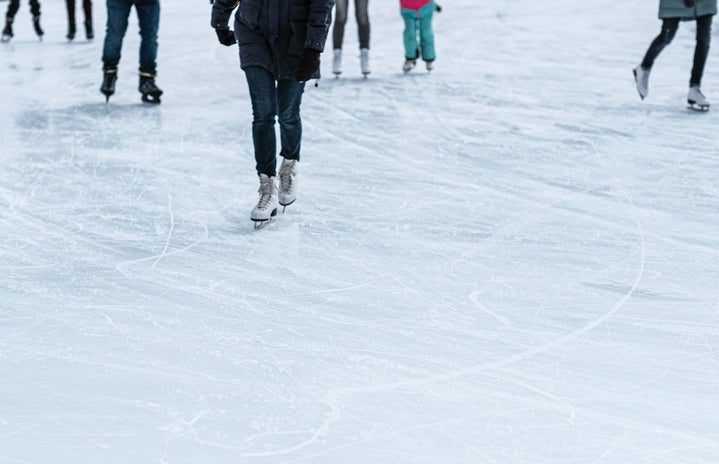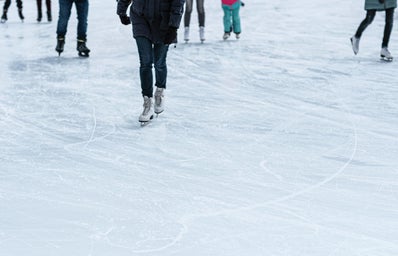Despite concerns about coronavirus spread, an extremely limited spectator policy, and a tense geopolitical moment, the 2022 Winter Olympics in Beijing began with joy and celebration on February 4. Now, two weeks later, it’s impossible to peruse the latest updates on social media without hearing about Kamila Valieva, the fifteen-year-old Russian figure skater currently mired in controversy.
The young athlete, who led the Russian Olympic Committee to a figure skating team gold early in the games, landed high-flying tricks and racked up impossibly high scores in the events she skated. However, days after the Internet had begun celebrating her prowess on the ice, results of a doping test she took back in December showed that Valieva had tested positive for the banned drug trimetazidine. The Court of Arbitrations for Sport, an independent body from the International Olympic Committee (IOC), then held a hearing to consider Valieva’s case. In less than half a day, the court cleared her to keep competing, citing a regulation that, due to her age, classifies her as a “protected person” under the World Anti-Doping Code. So Valieva was back on the ice on February 15, immediately after her case had been cleared. Current and retired athletes, coaches, and Olympic aficionados alike are left wondering: Why?
This story doesn’t begin with Valieva, however. Most Olympic fans will know that her home country of Russia has a rocky relationship with Olympic competition. In 2016, a whistleblower revealed that for years Russia’s national athletic teams had operated a massive doping enterprise, supported by the state. The source, Dr. Grigory Rodchenkov, exposed a meticulous and enormous effort by Russian scientists, coaches, and government officials to hide the performance-enhancing drugs that Russian athletes were taking, a scheme involving shadow laboratories and the swapping of urine samples, particularly at the 2014 games in Sochi, where Russia won the most medals of any country.
Investigations ensued, and in 2017 the IOC suspended Russia from competition, and in 2019 the World Anti-Doping Agency leveled a four-year ban against the country in all international athletic competition. Russia’s national anthem and flag would not be allowed at any global sporting event. After petitions from Russian athletes not involved in the scandal, the Court of Arbitrations for Sport—the same court which days ago allowed Valieva to keep competing—permitted Russian athletes to compete neutrally in international competitions. Hence, in the 2021 Summer Olympics and the 2022 Winter Olympics, we’ve seen Russian athletes compete under the banner of the “Russian Olympic Committee,” although news outlets and commentators may just shorten this to “Russia.” The ban against Russia in an official capacity, which was later shortened to two years, is set to end in December 2022.
So Valieva’s possible scandal does not exist in a vacuum, but in the context of repeated doping abuses from Russian athletes and coverup by officials. The test sample which flagged her for the drug was analyzed in Sweden, but the result didn’t return for six weeks, despite the approaching games.
The test’s extensive results showed that Valieva tested positive for three heart drugs, Hypoxen, L-carnitine, and the banned substance trimetazidine; the first two are legal, and she declared them before taking the test. Ostensibly, the purpose of these drugs would be for “increasing endurance, reducing fatigue and promoting greater efficiency in using oxygen,” according to Travis Tygart of the US Anti-Doping Agency. Together, the drugs might bolster Valieva’s already robust talent by improving her stamina on the ice and calming her nerves. During her hearing, Valieva told the panel that she had taken the trimetazidine only by accident, because of a mixup with her grandfather’s medication.
When Valieva returned to skate her short program on Tuesday, enthusiastic NBC commentators Tara Lipinski and Johnny Weir both remained mostly reticent, declining to provide much commentary to the skater’s dazzling routine. Lipinski remarked that “We should not have seen this skate,” a solemn condemnation of the Court’s decision. American sprinter Sha’Carri Richardson has also spoken out about the situation, claiming there is a double standard between her treatment and Valieva’s. After qualifying through the US Olympic trials in June 2021, Richardson received a positive drug test for marijuana, for which she was awarded a one-month ban on competition. Because of the ban, Richardson, who was favored to medal in the 100m dash, could not compete in the Summer Olympics in Tokyo. Richardson has questioned publicly why she was treated so differently than Valieva; it is possible that if the Russian anti-doping agency RUSADA had ensured Valieva’s result was received prior to the competition, she would have been in a situation similar to Richardson. In allowing Valieva to continue competing, Richardson says the IOC has upheld a possibly racialized double standard that reflects poorly on the spirit of the Olympics.
At the same time as many former athletes have raised their concern and outrage, many have also reminded viewers that Valieva is only fifteen, and likely a victim of the system around her. She began skating at the age of three, and by the age of six moved to Moscow to train, eventually with the well-known figure skating coach Eteri Tutberidze. Tutberidze’s coaching has produced several world and Olympic champions, but lately, her methods have come under heavy scrutiny. Like Valieva, Tutberidze’s champion skaters are almost invariably young—fifteen years is the youngest age of competitors allowed in Olympic figure skating—and tend to burn out quickly, often with long-term injuries or eating disorders. Her skaters astonish, and push the boundaries of the sport: this year, Kamila Valieva was the first female skater to land a quad jump, or four turns in the air, at the Olympics, landing several throughout her programs with ease. But Tuberidze’s pattern of perfecting a young skater every four years for Olympic glory, then moving to the next, seems to threaten the dignity and safety of skaters and the sport as a whole.
Figure skating, like gymnastics, has been criticized as a sport that accepts only perfection, and hurts its athletes, physically and emotionally, in the process. Both sports award points to athletes based on their performance of skills, as ascertained by an independent panel of judges. Instead of sports that measure speed, strength, or ability to gain points as a team, figure skating and gymnastics hold a unique ethos, where the competitors are always striving for an almost-achievable realm of perfection, that golden 10.0, a goalpost that seems to stretch farther and farther away the closer the athletes approach. It’s also a sport governed by aesthetics, where a certain (thin) silhouette and physique often award the competitor an extra grace and advantage in the eyes of the judges.
After laboring under the watchful eyes of judges in Beijing, however, those other athletes in the Olympic team figure skating competition this year must keep waiting for their reward. The IOC has announced that it will not hold medal ceremonies for the events in which Valieva placed in the medal range, as doing so would “not be appropriate.” This announcement signals that the IOC disagrees with the Court’s decision to clear Valieva, and leaves her opponents in a no-man’s-land over whether these competitions are even legitimate. The second-place American team will have to wait until after the games conclude on February 20, and perhaps longer, to determine whether they will actually win silver and gold; the team’s athletes will go without the famed Olympic medal ceremony and broadcasting of their national anthem, at least for now. If Valieva is awarded the gold medal, Tchaikovsky’s Piano Concerto No. 1 would play on the speakers; the Russian anthem isn’t allowed.
All told, Kamila Valieva’s situation is a letdown for everyone involved in the sport and this year’s Olympics, Valieva herself included. For some, it represents a further violation of the Games’ integrity, or a racialized double standard; for others, it is an unjust obstacle to their earned celebration of success, or another, unsurprising instance in a history of abuses; for many, it is a disappointment that interferes with the honest efforts of other athletes. And for Kamila Valieva, the talented young athlete caught in the middle, it is a sobering mistake that may follow her for the rest of her career.


